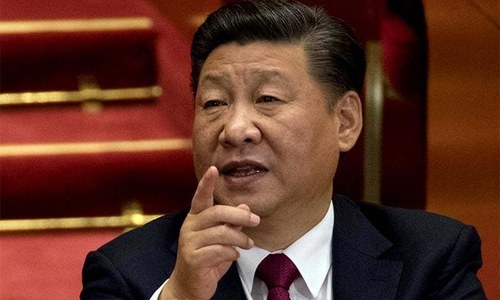China withdrew the press credentials of American journalists at three US newspapers on Wednesday, intensifying a bitter fight between the world’s top two economies over the spread of coronavirus and press freedoms.
The move comes after Beijing expelled three Wall Street Journal correspondents — two Americans and an Australian — last month following an opinion column by the newspaper that called China the “real sick man of Asia”.
The day before, the United States had announced that it would begin treating five Chinese state-run media entities with US operations the same as foreign embassies.
China denounced the newspaper’s column as racist and, after the newspaper declined to apologise, revoked the visas of the three reporters in Beijing. Another reporter with the paper had to leave last year after China declined to renew his visa.
Read: China expels WSJ reporter who wrote about Xi’s cousin
Then, in early March, Washington said it was slashing the number of Chinese nationals permitted to work at the US offices of four major Chinese state-owned media outlets to 100, from 160 previously. It cited a “deepening crackdown” on independent reporting inside China.
As the tit-for-tat battle escalated, Beijing on Wednesday announced that American journalists with press credentials expiring this year who work with The New York Times, the News Corp-owned Wall Street Journal, and The Washington Post, would not be permitted to work in mainland China, Hong Kong or Macau. It said they must hand back their press cards within ten days. It was not immediately clear how many journalists were affected.
It also said the China branches of the three papers plus the Voice of America broadcaster and Time magazine must “declare in written form information about their staff, finance, operation and real estate in China.”
Beijing said it was retaliating against US restrictions on Chinese journalists.
A striking aspect of Beijing’s response was its decision to bar the journalists from working in Hong Kong and Macau, two semi-autonomous territories of China with their own media accreditation rules. In the past, foreign journalists kicked out of China were allowed to work in Hong Kong.
This raised questions about Hong Kong’s autonomy under the “one country, two systems” agreement that still prevails between the territory and the mainland.
“There’s no precedent for China dictating who can and can’t report from Hong Kong openly,” said Steven Butler, the Committee to Protect Journalists’ Asia program coordinator. “It very seriously erodes Hong Kong’s autonomy and freedom of the press.”
The latest development follows a war of words between Washington and Beijing over the outbreak of the new coronavirus that causes the sometimes fatal, highly contagious respiratory illness COVID-19. The virus originated in the Chinese city of Wuhan late last year and has so far killed 7,400 people across the world, and almost brought normal life to a standstill.
Read: US, China accuse each other of coronavirus fear-mongering
US Secretary of State Mike Pompeo told reporters at a State Department news conference that Beijing’s move on Wednesday would deprive the world and the Chinese people of information in “incredibly challenging” times brought about by the coronavirus.
“I regret China’s decision today to further foreclose the world’s ability to conduct the free press operations that frankly would be really good for the Chinese people,” he said. “This is unfortunate ... I hope they’ll reconsider.”
Media executives denounce move
“We unequivocally condemn any action by China to expel US reporters,” said The Washington Post Executive Editor Marty Baron in a statement. “The Chinese government’s decision is particularly regrettable because it comes in the midst of an unprecedented global crisis, when clear and reliable information about the international response to COVID-19 is essential.”
Dean Baquet, executive editor at The New York Times, also condemned the decision.
“It is a grave mistake for China to move backwards and cut itself off from several of the world’s top news organisations,” he said.
Matt Murray, Editor in Chief at The Wall Street Journal and Dow Jones Newswires, said: “We oppose government interference with a free press anywhere in the world. Our commitment to reporting fully and deeply on China is unchanged.”
Time Editor in Chief and CEO Edward Felsenthal said: “We oppose any effort by the Chinese government or any other government to expel reporters or intimidate those whose job is to provide accurate information, especially during this crucial period for the world.”
A representative of Voice of America was not immediately reachable.
Beijing said on Wednesday that its actions “are entirely necessary and reciprocal countermeasures that China is compelled to take in response to the unreasonable oppression the Chinese media organisations experience in the United States”.
Pompeo said he did not think Beijing’s latest move was a balanced response. “This isn’t apples to apples,” he said, charging that the Chinese journalists who had faced restrictions were part of “propaganda outlets”.














































